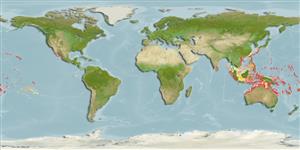Environment: milieu / climate zone / تغييرات عمق / distribution range
بوم شناسي
دريايي وابسته به آب سنگ; غير مهاجر; تغييرات عمق 0 - 40 m (Ref. 7247). Tropical; 35°N - 25°S
Western Pacific: widespread, from southern Japan to Australia and Tonga; no records from Hawaii nor French Polynesia. Replaced by Chromis opercularis in the Indian Ocean (Ref. 129596).
Size / Weight / سن
بلوغ: Lm ? range ? - ? cm
Max length : 17.0 cm TL جنس نر / بدون خواص جنسي; (Ref. 90102)
خارهاي باله پشتي (کل) : 13; شعاع نرم باله پشتي (کل) : 10 - 11; خارهاي باله مخرجي: 2; شعاع نرم باله مخرجي: 10 - 11. This species is distinguished by the following set of characters: D XIII,10-11(mode 11); A II,10-11 (11); pectoral-fin rays 18-20 (19); upper and lower procurrent caudal-fin rays 3; pored lateral-line scales 17-18 (18); gill rakers 6-8 (7) + 19-22 (21) = 26-30 (28); longest dorsal-fin soft ray length 24.6-36.4% (mean 29.4%) of SL; first anal-fin spine length 6.5-8.4% (7.1%) of SL; caudal-fin length 43.9-59.8% (48.6%) of SL; posterior tips of caudal-fin lobes are filamentous; broad black bands along the preopercular and opercular margins, sum width of two bands 15.3-27.9% (23.6%) of head length; distal half of soft-rayed portion of the dorsal fin is transparent in adults; upper or lower caudal-fin base no triangular black blotches; caudal peduncle and fin are tinged with yellow; soft-rayed portions of dorsal and anal fins are yellowish, with spinous portion of dorsal and pelvic fins dark blue in juveniles (Ref. 129596).
Body shape (shape guide): short and / or deep; Cross section: compressed.
Adults are found in steep outer reef slopes and shallow coastal reef flats, sometimes forming large aggregations feeding on zooplankton several meters above the bottom. Juveniles remain close to shelter. Oviparous, distinct pairing during breeding (Ref. 205). Eggs are demersal and adhere to the substrate (Ref. 205). Nests are found in small patches of loose sand under ledges or at the base of slopes (Ref. 9710). Males guard and aerate the eggs (Ref. 205). Diurnal species (Ref. 54980; 113699). Minimum depth reported taken from Ref. 128797.
Life cycle and mating behavior
بلوغ | تولید مثل | تخم ریزی | تخم ها | Fecundity | توزاد ( لارو)
Oviparous, distinct pairing during breeding (Ref. 205). Eggs are demersal and adhere to the substrate (Ref. 205). Males guard and aerate the eggs (Ref. 205).
Allen, G.R., 1991. Damselfishes of the world. Mergus Publishers, Melle, Germany. 271 p. (Ref. 7247)
وضعيت در فهرست قرمز IUCN (Ref. 130435: Version 2025-1)
خطر برای انسان ها
Harmless
استفاده انسانی
ماهي گيري – شيلات: تجاري; آكواريوم: تجاري
ابزارها
گزارش های ويژه
بارگيری XML
منابع اينترنتي
Estimates based on models
Preferred temperature (مرجع
123201): 24.7 - 28.9, mean 27.7 °C (based on 424 cells).
Phylogenetic diversity index (مرجع
82804): PD
50 = 0.5000 [Uniqueness, from 0.5 = low to 2.0 = high].
Bayesian length-weight: a=0.01413 (0.00674 - 0.02961), b=2.94 (2.76 - 3.12), in cm total length, based on LWR estimates for this species & Genus-body shape (Ref.
93245).
Trophic level (مرجع
69278): 3.4 ±0.45 se; based on food items.
جهندگی (مرجع
120179): متوسط, كمينه زمان لازم براي دو برابر شدن جمعيت 4/1 – 4/4 سال (Preliminary K or Fecundity.).
Fishing Vulnerability (Ref.
59153): Low vulnerability (10 of 100).
🛈
Nutrients (Ref.
124155): Calcium = 79.2 [39.4, 122.1] mg/100g; Iron = 0.721 [0.430, 1.172] mg/100g; Protein = 18.3 [17.2, 19.4] %; Omega3 = 0.116 [0.070, 0.190] g/100g; Selenium = 25.6 [13.4, 49.3] μg/100g; VitaminA = 132 [39, 433] μg/100g; Zinc = 1.25 [0.83, 1.78] mg/100g (wet weight);
